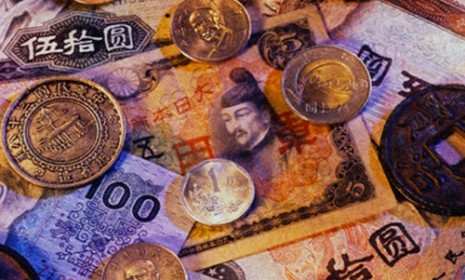The China currency crisis: What every American should know
Why the U.S. wants China to let its currency rise in value, and why Beijing has been reluctant to do it

The value of the Chinese yuan crept higher this week, amid hopes that Chinese authorities might finally be preparing to ease control of their currency. The U.S. and other nations have been pressuring China to make the move for the good of the world economy. Why is China so reluctant to let its currency rise, and what does it matter to us? (Watch Obama address China's currency)
What's the problem in a nutshell?
The Obama administration and many other foreign governments say China is purposefully keeping the value of the yuan, also sometimes called the renminbi, artificially low. This allows it to export goods far more cheaply than other countries can, giving it an economic advantage over competing economies, such as the U.S.
The Week
Escape your echo chamber. Get the facts behind the news, plus analysis from multiple perspectives.

Sign up for The Week's Free Newsletters
From our morning news briefing to a weekly Good News Newsletter, get the best of The Week delivered directly to your inbox.
From our morning news briefing to a weekly Good News Newsletter, get the best of The Week delivered directly to your inbox.
How does this harm the U.S. economy?
The U.S. has a large trade deficit with China — which basically means China exports far more products to the US than the other way around. In addition, it allows China to undercut American exports to other markets. It's one of the reasons that, according to one think tank, 2.4 million U.S. manufacturing jobs were lost between 2001 and 2008.
Who else does it affect?
Other export markets in Asia, Europe, and Latin America, and the Chinese people themselves. An artificially low currency means ordinary Chinese households are kept in comparative poverty. Not only are they unable to buy expensive goods from overseas, they are priced out of property and investment markets in their own country by overseas investors.
A free daily email with the biggest news stories of the day – and the best features from TheWeek.com
How does China keep the yuan so low?
By selling huge amounts of its currency at an extremely low price. Since 2002, China has reportedly sold $2.18 trillion worth of the yuan to keep it from gaining in value. In addition, China keeps its currency pegged to the U.S. dollar, so whatever happens to the American currency — such as fluctuations due to changing interest rates — happens to the yuan, too. This means that Chinese goods effectively stay the same price overseas, no matter how strong or weak the dollar is.
How low is the yuan right now?
The U.S. Treasury says it is worth around 40 percent less than it should be. The yuan is always worth approximately 14 cents.
Does China admit its currency is undervalued?
No. Chinese authorities say the U.S. complaints are an attempt to blame China for America's economic troubles. Beijing says it has merely kept the yuan stable, without constant fluctuations, to remain competitive in world markets. Even so, the Chinese government is expected to announce soon that it will allow the yuan to appreciate against the dollar, within strictly set parameters.
Why?
China's economy is growing "darn fast", says Michael Schuman in Time, with its GDP rising a "spectacular 11.9 percent" this year. Unless something is done to temper China's boom, its economy is likely to spiral into inflation. Analysts think Beijing will allow the yuan to get more expensive so that its economy cools down.
Will that solve all of America's economic woes?
No. Any currency appreciation will be modest at best — perhaps 3 to 5 percent, says Daniel H. Rosen in The New York Times. China allowed the yuan to appreciate slightly against the dollar from 2005 to 2008. It didn't slow China's export growth or halt the "ballooning trade surplus" with the U.S., says Desmond Lachman, also in the Times. There's no reason to believe the next upward bump for the yuan "will be any more successful."
Why are we so desperate for it to happen then?
It is in the interest of the U.S. for China to have a more balanced economy, and analysts agree that loosening control of the yuan is an important first step toward making that happen. It may also improve China-U.S. relations, says Eswar Prasad in The New York Times. Obama and Hu Jintao will be able to focus on "important economic and strategic issues rather than getting into petty trade disputes."
Sources: BusinessWeek, New York Times, BBC, Time, CNN
-
 Grok in the crosshairs as EU launches deepfake porn probe
Grok in the crosshairs as EU launches deepfake porn probeIN THE SPOTLIGHT The European Union has officially begun investigating Elon Musk’s proprietary AI, as regulators zero in on Grok’s porn problem and its impact continent-wide
-
 ‘But being a “hot” country does not make you a good country’
‘But being a “hot” country does not make you a good country’Instant Opinion Opinion, comment and editorials of the day
-
 Why have homicide rates reportedly plummeted in the last year?
Why have homicide rates reportedly plummeted in the last year?Today’s Big Question There could be more to the story than politics